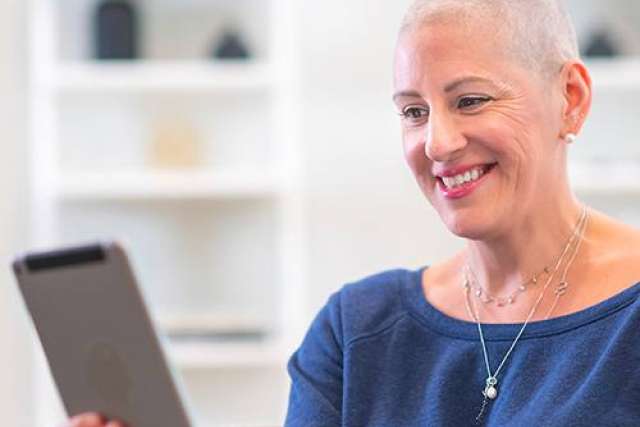Gynecologic cancer patients and their families may have questions regarding protective measures and cancer treatment as the COVID-19 pandemic continues
Beth Karlan, MD, a UCLA Health cancer specialist, explains how to maintain your gynecologic cancer care during COVID-19. Dr. Karlan is a professor and vice chair of women’s health research of obstetrics and gynecology at the David Geffen School of Medicine at UCLA and director of cancer population genetics at the Jonsson Comprehensive Cancer Center.
If I have gynecologic cancer should I continue my follow-up appointments?
Yes! Your health is our top priority and we will not let COVID-19 interfere with the goals of your cancer treatment. However, the pandemic may change how and where you see your physician. For some of you, telemedicine visits may be the best option for follow-up appointments. Video visits provide a safe and effective way to stay in close communication with your gynecologic oncologist and care team. If blood tests are needed to monitor your therapy, they can often be done at an outside lab near your home. In some cases, an in-office visit is required due to the need to receive IV chemotherapy, a physical exam or other procedures.
Are clinics safe to visit and are they all open?
The oncology clinics are open and safe to visit. Please be assured that we have adopted mandatory masking procedures, pre-visit patient symptom and temperature screenings, stricter cleaning procedures, as well as physical distancing in waiting rooms. UCLA Health has implemented the most effective infection prevention policies for our patients and staff so that you can feel safe when coming in for care.
How do I weigh risks and benefits of an in-person appointment?
If you have a concern regarding leaving your home for your scheduled appointment, please discuss this with your physician to weigh the risks and benefits in your particular case.
Do telemedicine and video visits work for cancer care?
Yes, video visits allow us to successfully stay in close touch with our patients and families to provide ongoing cancer care and support. Often, we can effectively manage symptoms and prescribe indicated medications through video visits. Staying in touch with your care team also helps relieve some of the anxiety and stress that you may have regarding the impact of COVID-19 and its impact on your care. While we all miss the in-person closeness between physician and patient, for now, the video visits provide virtual house calls. Current patients can schedule a video appointment directly through myUCLAhealth.
If I have confirmed, probable, or suspected COVID-19, should I continue my gynecologic cancer care as scheduled?
Specific management of your cancer will depend on the severity of your COVID-19 related illness. However, interrupting anti-cancer treatment in patients with active COVID-19 should be strongly considered as continuation of treatment may lead to further immunosuppression and risk for serious complications. It is important to discuss your treatment plan directly with your physician.
Are there special precautions gynecologic cancer patients should be taking?
Specific precautions that we recommend for gynecologic cancer patients include:
- You should monitor your temperature daily and contact your physician if your temperature approaches 100oF, have a cough or difficulty breathing, or experience new symptoms including a loss of taste or smell, diarrhea, and muscle aches. Most importantly, take the necessary precautions to prevent infection, including frequent and thorough hand washing, social distancing, and staying at home.
- You may want to minimize clinic, hospital and laboratory visits in favor of video visits and home-based or local collection of labs, when appropriate.
- You may want to reschedule asymptomatic surveillance visits and conduct routine post-operative visits and discussion of pathology results with video visits.
- If you are in active cancer treatment, your doctor may consider chemotherapy regimens that will avoid frequent clinic visits, such as weekly treatment regimens.
- Second opinions may be accomplished with the use of a video visit even across state lines.
- Enrollment and treatment in some clinical trials may be delayed. However, if you are already participating in a clinical trial, the majority of those treatments are ongoing.
- If you are scheduled for surgery, some procedures may be scheduled as usual or delayed as appropriate, depending on various factors determined by your gynecologic oncologist in collaboration with UCLA Health leadership. If you have a surgery or procedure scheduled in one of our hospitals or outpatient surgery centers, you will likely receive a COVID-19 test before your appointment.
The COVID-19 pandemic is changing rapidly, requiring UCLA Health to make ongoing adjustments to our healthcare guidelines. So, it is important to stay in touch with your physician and care team regarding your gynecologic cancer care.




